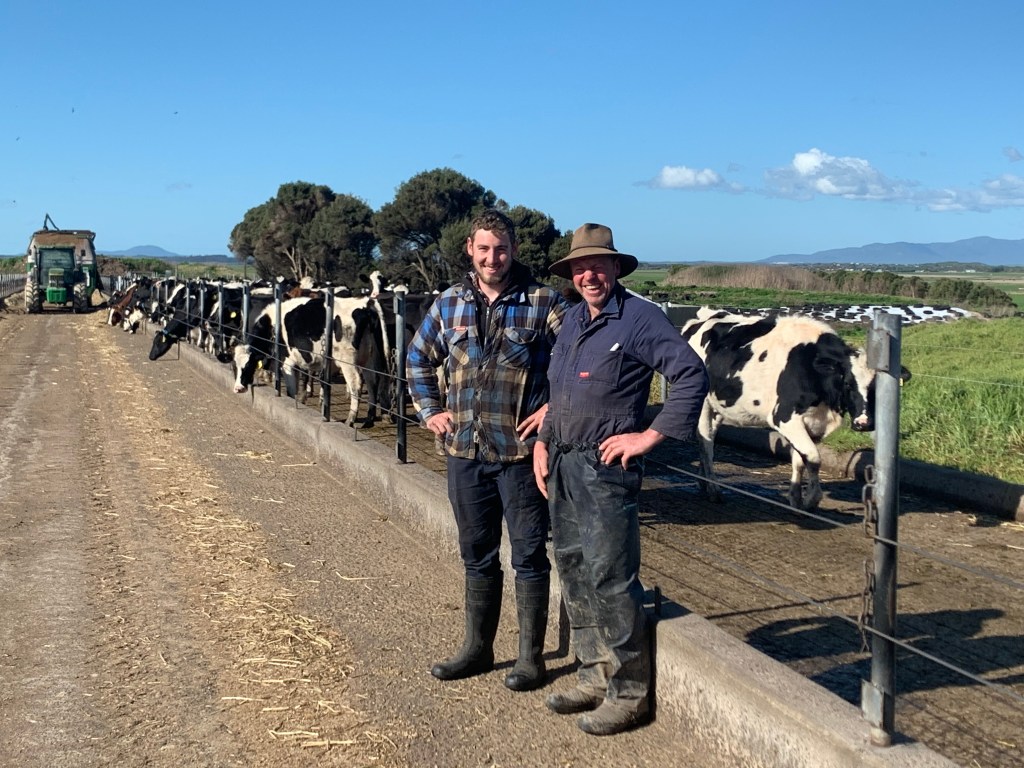Environmental focus for Gippsland breeders
Genetics is helping one Gippsland dairy farming family reduce their business’ carbon footprint, while bolstering herd health and productivity.
Stuart and Jacqui Tracy, with their son Angus, milk 700 cows at Waratah Bay in Victoria as part of a family business which also includes their daughters Carmen and Leila. Their Holstein herd is ranked number 33 on the Australian Breeding Values top herds list. The Tracy’s also run an extensive three-way-cross breeding program. Choosing high-ranking and profitable sires that improve herd health is their top breeding priority, while they also have progeny from ABS sires linked to greenhouse gas emissions intensity reduction.
For Stuart and Jacqui, running a sustainable business requires a whole-farm approach. To them, farming for the future includes concentrating on profit, animal health, welfare, and longevity, while reducing environmental impact and considering consumer and societal expectations. “We are here for the long term,” Stuart said. “We want to leave our farm in better shape than when we found it, that’s why we have adopted a different approach – more regenerative- transitioning away from urea and commercial fertilisers to a more biological products so we can sequester more carbon into the soil and improve the soils in the process. When it comes to breeding, we want a more efficient cow with higher feed conversion efficiency, so we need less resources to produce milk.”
The Tracy’s are milking daughters from high Sustainability Index (SI) sire DG CHARLEY and have progeny from leading greenhouse gas emission intensity reduction sires ABS JERONIMO P and De-Su 13530 SEVILLE. They’ve also added industry leading health sires such as top ABS Red health and polled sire ONSTAD P and Australia’s top proven Holstein JERONIMO P into their breeding program in recent years. “His (Jeronimo’s) daughters are travelling well, they come into the dairy well and are very quiet, easy to manage and we have more Jeronimo calves this year,” Stuart said. “We initially chose to use him because he was a high-index young genomic sire with strong health traits. The fact he is still at the top, it is good to see we made the right choices using him in our breeding program.”
The Tracy’s breeding philosophy is underpinned by a desire to maximise health, welfare, sustainability, and profit. The best example of this is how they strategically use ABS Beef InFocus™ and sexed genetics. “Breeding our lowest genomic index cows in our herd to ABS Beef InFocus, increases our rate of genetic progress because it means we are breeding our replacements using sexed semen from the best cows in our herd,” Stuart said. “We are now joining 30 per cent of our herd to ABS Beef InFocus because we were breeding more than enough heifers using sexed semen strategically in the heifers and young, fertile and healthy cows.”

This year, Stuart and Jacqui sold ABS Beef InFocus heifers into their local store market, taking advantage of the strong demand for first-cross animals and are open to selling some at 10-days-old in years to come. Thirty pregnant ABS Beef InFocus heifers will also be marketed later this year and haven’t ruled-out fattening others in the future – if they have the capacity.
While “milk is number one” for the Tracy family, stock sales – such as the ABS Beef InFocus and export heifers – have become a bigger part of their business. The Tracy’s have more export heifers now they have reached capacity at their dairy farm. They select the lowest Balanced Performance Index (BPI) heifers for export. The only problem- it’s tough to select the ones to sell. Recently, there were just four heifers with a BPI less than 200 and some were more than 300 BPI. “It is hard to choose because we love our cows and they are all so high indexing,” Stuart said. “We choose using the BPI and HWI (Health Weighted Index) and look at cow families as well. We hope we are picking the right ones.”
Growing concerns about consumer perceptions of animal welfare in the dairy industry has prompted the Tracys to use genetics to address potential challenges. But they believe improving animal welfare through breeding, doesn’t have to come at the expense of vital profit or health traits though, according to Stuart and Jacqui. The inclusion of polled Holstein sire ELLIS PP, in their program, is proof of this. “A bull like ELLIS PP, there’s no question that he’s one of the best bulls on the market – polled or not,” Stuart said. “When you have bulls with an index like that, it’s a pretty simple choice.”
Like many farmers, Stuart and Jacqui knew their cows could produce milk – their herd averages about 600kg of milk solids/cow/lactation- but they wanted to ensure their cows also lasted in the herd and remained healthy. Using the industry’s BPI and HWI as guides, they’ve chosen bulls that ticked production and health boxes such as mastitis resistance and fertility. Some of the ABS sires they’ve used include; KNOWHOW, JERONIMO P, SPOCK, HAMLET, CHARLEY and his sons HOWLER, AMSTEL and DURABLE. And the Tracys have noticed the change these genetics have delivered to their herd. “We are starting to reap the benefits now,” Stuart said. “We were getting quite high not-in-calf rates in our heifers, but since (focusing on breeding for health) our in-calf heifer group has steadily improved, and we are seeing this improvement throughout the herd because it means they are staying in the herd longer.”
ABS Gippsland sales representative Alan Blum said the Tracy’s approach to breeding and genetics was “exceptional”. “They are one of the most productive farms I work with, they prove health and production can go hand-in-hand,” he said. “Their success comes from a strong focus on doing everything well, including genetics. They understand the role genetics plays in a profitable and sustainable dairy business and they maximise this value with good decisions and back it up with great management.”
